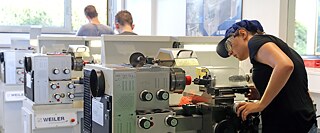The German Apprenticeship Model: Adapting to the Pandemic

The German apprenticeship model, which boasts a carefully crafted mix of both theoretical and practical on-the-job instruction, is a globally-respected benchmark for preparing young, high-school-aged learners for a broad variety of careers, including high skilled manufacturing careers. It is this model that educates, trains, and empowers Germany's most valuable natural resource - its human talent - to become the key ingredient behind the "Made in Germany" brand, which stands for innovation and quality. At the center of the German manufacturing universe, consisting of the highest density of family-owned, small and medium-sized enterprises of anywhere in Europe, is the town of Gaggenau in the Black Forrest region near the French border.
The Transatlantic Outreach Program (TOP) and the Goethe-Institut Visitors Programme invite you to a presentation and discussion with Dr. Falk Hartmann who is the Head of Vocational Training at the Carl Benz School in Gaggenau. The Carl Benz School offers learners, often as young as 16 or 17, both initial vocational training in metalworking, mechatronics, and automotive engineering as well as the possibility of attaining advanced degrees, entitling the graduates e.g. to continue to a university of applied sciences or to qualify as a state-certified technician. Dr. Falk Hartmann will discuss the apprenticeship model in the state of Baden-Württemberg, how it works, how it is adapting to COVID-19, and how it is preparing Germany for the future of "Industry 4.0" manufacturing beyond the pandemic.
Date: Tuesday, July 14, 2020
Start Time: 11:00 AM EDT / 17:00 CET
End Time: 12:30 PM EDT / 18:30 CET
WEBINAR RELATED CONTENT (some password protected content)
 Webinar Recording
Webinar Recording
 Powerpoint Presentation
Powerpoint Presentation
 Carl Benz Schule YouTube
Carl Benz Schule YouTube